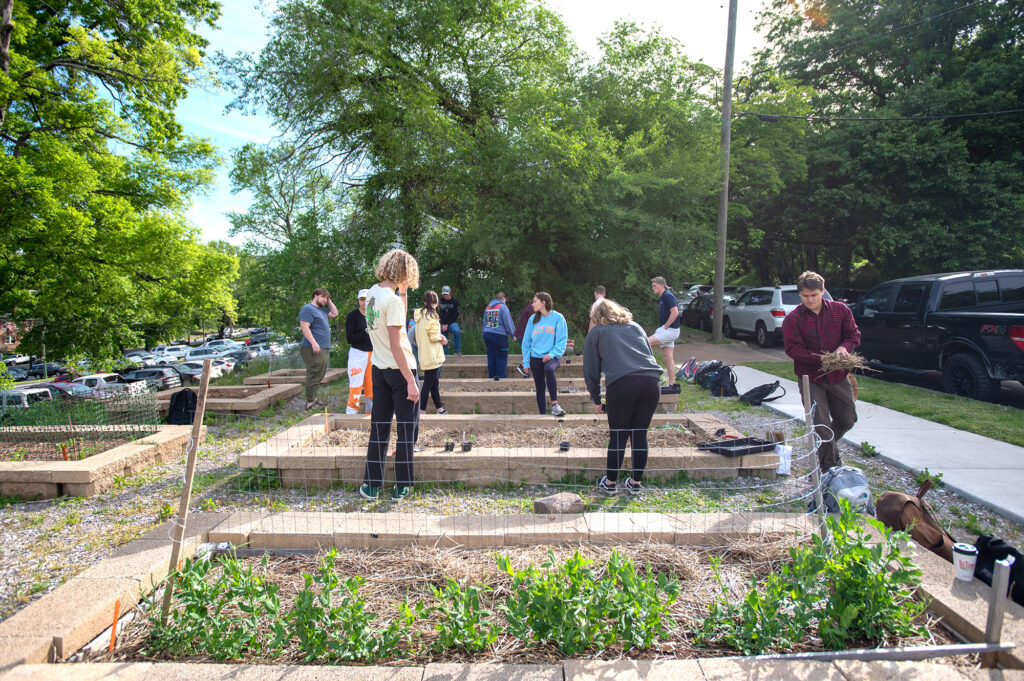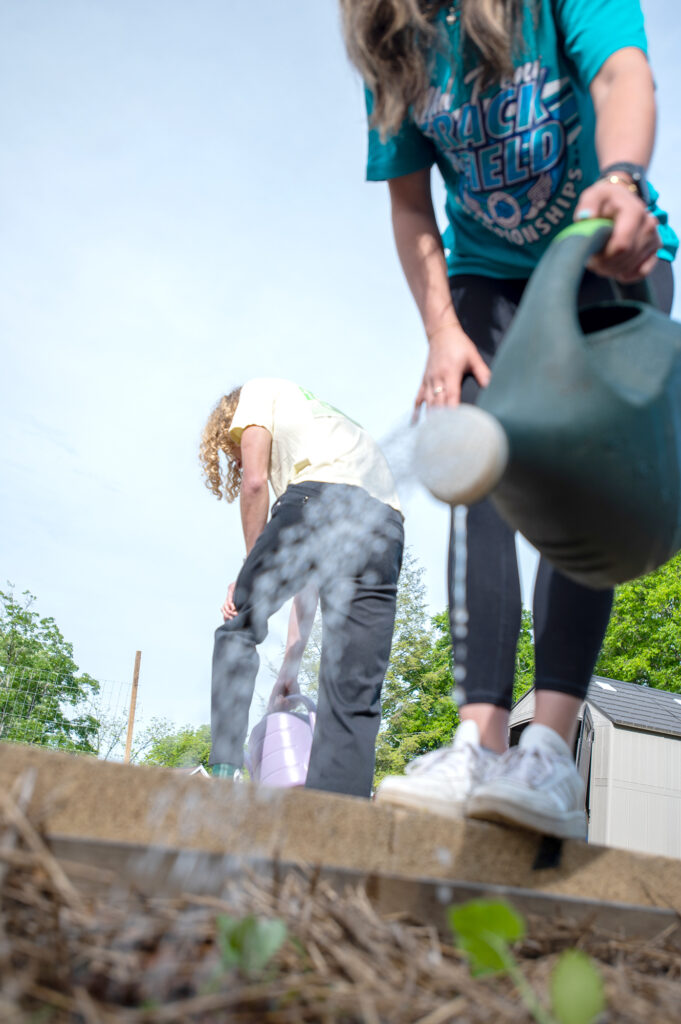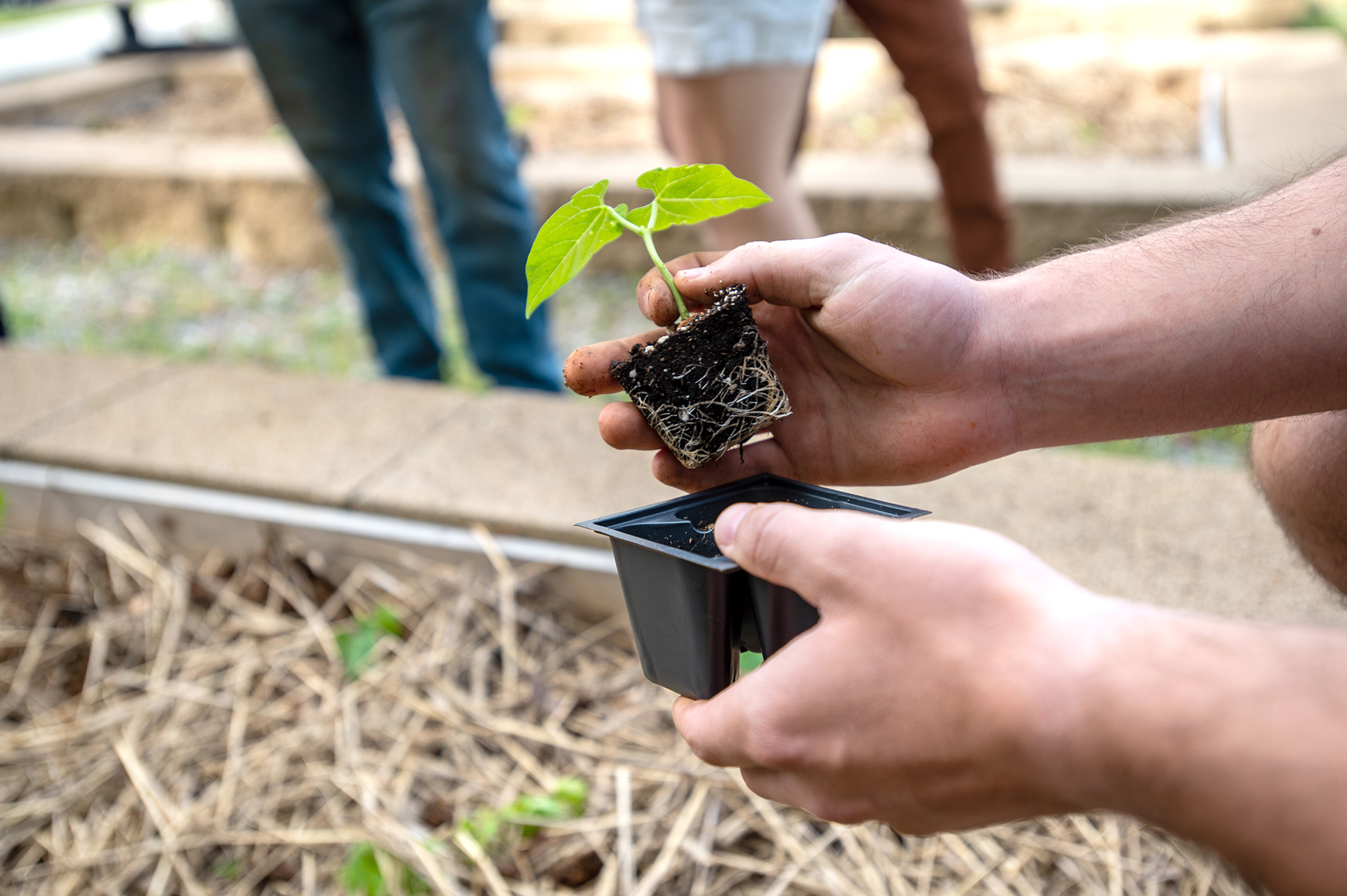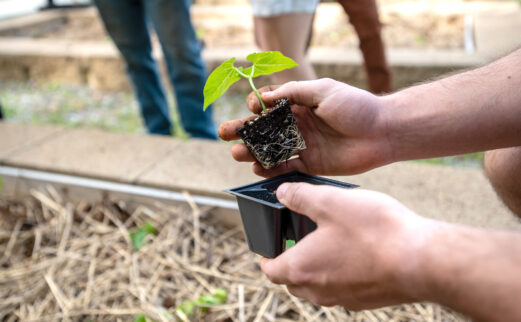
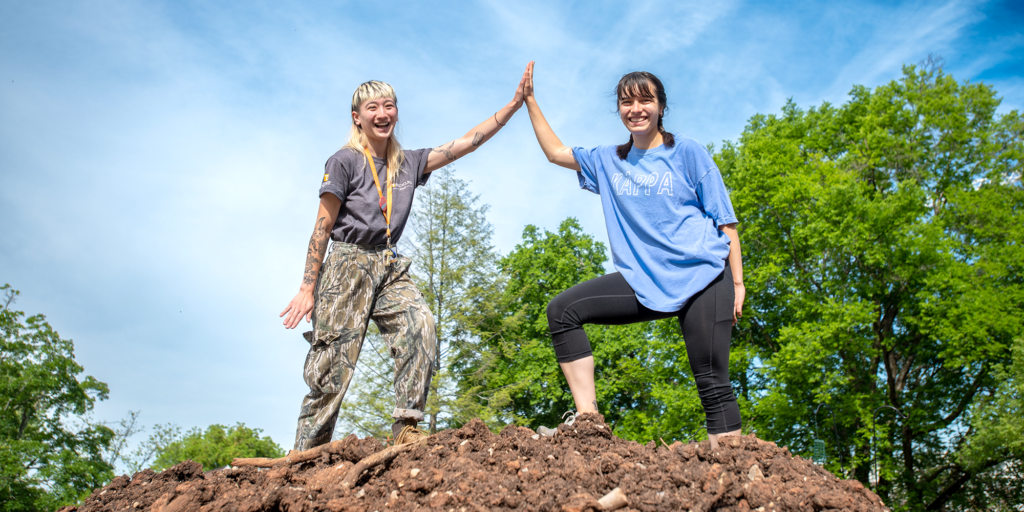
On a sunny morning, students in Amanda Spangler’s plant sciences class nestle broccoli, cabbage, and swiss chard seedlings into the rich soil of raised concrete beds at UT’s Grow Lab. They pat the soil around the tender shoots and water them before moving on to plant the next row.
The seedlings, many grown from seed packets obtained through UT Libraries, will become a harvest that addresses food access issues on campus, enhances student experiential learning, and empowers students to lead healthier, more sustainable lifestyles.
Eventually the produce is delivered to the Big Orange Pantry, a campus resource for those in need of food support. From there it will make its way to the pots and plates of students, faculty, and staff.
“Food insecurity is a huge thing for students here,” said Spangler, a lecturer in the Department of Plant Sciences. “Forgoing an opportunity to earn an income so that you can be a student, it can be really difficult to make ends meet—much less get healthy food and vegetables.”
Growing Interest
The idea to partner with the Seed Library sprouted during Spangler’s meeting with Samantha Ward, director of the Pendergrass Agriculture and Veterinary Medicine Library.
UT Libraries has been a key partner in supporting student basic needs in profound ways, from providing a welcoming space for all students to being a hub of exceptional service, friendliness, and community.
Addressing food insecurity is a natural extension of that mission.
“We understand the connection between basic needs and success,” Ward said. “It is imperative that basic needs are met if we expect students to succeed in the classroom. It’s not just the narrowest definition of providing information in the academic sense. We want to serve their whole being.”
The Seed Library, established in 2018, offers free vegetable, herb, fruit, and flower seed packets along with information about gardening activities. The seed packets, housed in vintage card catalogs, are available at Pendergrass and Hodges Libraries.
In the spring and fall, students in Spangler’s 200- and 400-level courses use the Seed Library as part of their hands-on learning. They experience growing a crop from seed to harvest and expand their knowledge about unique seeds and varieties—expensive items typically highlighted in trendy seed catalogs.
Connecting students to the Seed Library gives them agency: they pick what they will grow. This gives them a better understanding of the food they’re eating.
“There’s a disconnect when you go pick up something at a grocery store. It’s so easy and accessible, you don’t fully appreciate all the work it involves. Hopefully, getting experience growing these crops from seed to harvest they have a better appreciation of what goes into it,” Spangler said.
The students are turning their love of food into making a difference. They’re excited about growing food, eating it, and feeding people.
“It’s not just a garden for garden’s sake,” she said.
For Giuliana Castillo, a senior in economics with a minor in plant sciences, learning about varieties of seeds, tending plots, and harvesting the produce are fulfilling. She enrolled in Spangler’s fall Fruit and Vegetable Crops course to discover more about vegetable production and the scientific thinking behind crop care.
“I really enjoy it. It feels very good to know that all the things I produce are being consumed for free. If it came out of the ground, why put a price on it?” said Castillo, who serves as the student manager of the Grow Lab, an initiative of the UT Office of Sustainability.
Castillo harvests the crops several times a week and delivers them to the Big Orange Pantry.
‘Every Herb under the Sun’
The types of seeds available in the Seed Library are seasonal and intentional, said Ward.
“We try to be thoughtful about the environment that our students are living in, so we try to have pot-friendly things that are suitable for an apartment or patio,” she said.
Flower seeds are abundant, along with vegetables like peppers, spinach, brussels sprouts, tomatoes, different kinds of squash, and “almost every herb under the sun.”
Pendergrass has expanded its collection of seeds to represent different palates around the world. Offerings now include seeds for foods like bok choy and mizuna along with herbs like fenugreek.
As a result, the diversity of produce that ends up at the Big Orange Pantry is impactful for a lot of UT’s international students, according to Brianna Smith, coordinator for basic needs operations for the Office of the Dean of Students, which operates the pantry.
“It allows them to create food as if they were home,” she said. “We try to give them that sense of self rather than just the American classics.”
The herbs are helpful as they can be expensive at the grocery store, Smith said, and donated herbs allow the pantry to use its resources to purchase other items.
The Big Orange Pantry points its clients back to the Seed Library, which brings the partnership full circle.
“We encourage students to start planting themselves and create an urban garden, so it adds that sustainability element,” Smith said.
The Seed Library packets are portioned in a way that doesn’t overwhelm students.
“That way, students don’t feel so bad about taking lots of different things to experiment with. And they’re not wasting seeds,” said Spangler.
The hands-on experience of planting, watering, and harvesting can be the decisive point in students making it a lifelong practice.
“I really enjoy using the Seed Library and Grow Lab in my classes,” Spangler said. “The purpose of these resources is to empower students outside class. Sometimes it’s a little easier to get started when they’re part of a group. Hopefully everyone will be using these resources—because they’re awesome.”
Recent News
More News- Pride of the Southland: History of UT’s Marching Band
- Fall 2024 Awards and Recognitions
- The Pursuit of Justice: Evidence from our Special Collections
- Reduced Library Hours Sept. 20 & Sept. 22 Due to Morgan Wallen Concerts
- Associate Dean of Libraries Teresa Walker Retires
- New Self-checkout Experience at Hodges Library
- Not Your Grandmother’s Library
- What’s New? Library Resources and Free E-textbooks available in Canvas
